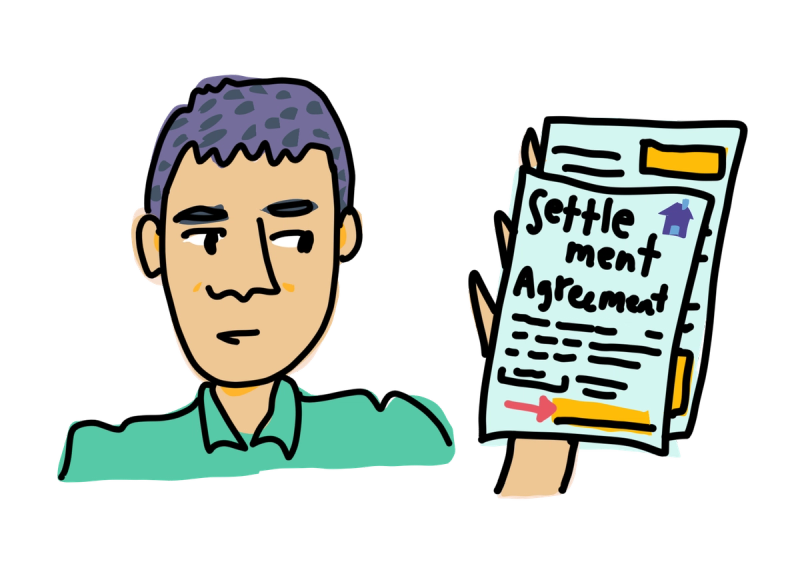Eviction Settlement Reviewer

A language-accessible AI assistant that reviews proposed eviction settlements to flag burdensome terms, explain how the settlement can play out, and support informed, strategic decision-making.
Project Description
Every day, tenants facing eviction are handed settlement agreements that can drastically affect their housing, finances, and legal rights—often without a lawyer to guide them. They may be in the courtroom hallway, just about to go in front of the judge to raise defenses or counterclaims about the eviction. A landlord's attorney or landlord may hand them a piece of paper -- a proposed settlement contract -- and ask them to sign it to make the lawsuit go away and work out a deal.
Many settlements are dense, technical, and offered with pressure to sign on the spot. Service providers report that many tenants sign these agreements without knowing what they're agreeing to, and without understanding the terms that will now rule their housing, payments, and future possible evictions.
- Many settlement agreements are heavily landlord-favorable and contain provisions that:
- Waive the tenant’s rights if they miss a single condition (e.g., rent payment or move-out date).
- Put onerous conditions on them if they do stay in the home.
- Put them on payment plans they cannot afford, and then have steep penalties if they miss a payment.
- Result in entry of a money judgment and preservation of an eviction judgment that will stay on a tenant's records
- These provisions are often not reviewed meaningfully with tenants before signing.
- Agreements tend to be dictated by landlords or their attorneys.
- There is a pressing need for education and structured review support for tenants facing settlement decisions.
This project proposes an AI-powered tool that can analyze these proposed agreements and help tenants understand what they’re being asked to sign.
The tool would:
- Scan settlement PDFs (or screenshots) and identify key clauses using NLP and legal domain expertise.
- Highlight potentially harmful or unusual provisions, such as waivers of future claims, strict payment schedules, or one-sided release language.
- Explain the implications of each clause in plain language: What does this mean for your rent balance? Will it hurt your chances in future disputes? Does it limit your ability to fight back if things go wrong?
- Offer scenario-based forecasts: “If you sign, here’s what may happen next month, next year, if the landlord violates the agreement, or if you fall behind again.”
- Support multilingual translations to ensure accessibility across immigrant and refugee communities.
- Suggest alternatives and empower the tenant to edit, counter, or decline the proposal. For example, “You could ask for more time to pay,” or “Consider removing this waiver of rights.”
Why This Matters
Eviction settlements are a legal gray zone where people often waive rights without understanding them. Studies and clinic experiences show that tenants frequently sign under duress, unaware of what they’re giving up. AI can provide a pause button—an informed second set of eyes—to improve fairness in these high-stakes negotiations.
If the person signs the settlement contract, it then becomes a court order that is binding and enforceable. It becomes the new rules for the landlord-tenant relationship, and some of these rules can be very one-sided and punitive. These contracts might also last for several years.
Some of these concerning terms include:
- The tenant's ability to stay in their home now depends on their conduct. If they do any action that the landlord disagrees with (whether it's parties, smoking, having guests, etc), the landlord can immediately set them out without going through a legal process. It is up to the landlord whether the tenant has violated the standards or not.
- The tenant must pay more rent, or additional fees.
- The tenant is put on an aggressive payment plan to pay back rent or other alleged fees, that they might not be able to afford.
- The tenant has no grace period. If they are late for any payment, they may be evicted without any process.
- The landlord puts additional requirements on the tenant for them to be able to stay in the home.
Read more from Nicole Summers, with her work analyzing eviction settlements in the New York City and Boston areas, and the patterns of burdensome clauses and unexpected penalties that were in these settlement agreements.
Magazine article on eviction settlements in Boston: https://lpeproject.org/blog/how-civil-probation-is-rewriting-eviction-law/
Law review article: https://review.law.stanford.edu/wp-content/uploads/sites/3/2023/04/Summers-75-Stan.-L.-Rev.-847.pdf
Research into AI legal summarization and contract review (e.g., case law explainer tools, NDA analyzers) supports the feasibility of this tool’s backend logic.
Also, language access gaps persist in housing courts, and translation of legal documents remains a critical barrier to equity.
Potential Use Cases
- Tenants at self-help kiosks in court hallways reviewing agreements presented by landlords or court mediators.
- Legal aid organizations or community justice organizations offering settlement review clinics in the court hallways or through a remote connection.
- Courts scanning proposed settlements or stipulation agreements to ensure there is understanding and fairness before approval.
- Multilingual clinics or advocacy groups looking to increase language justice.